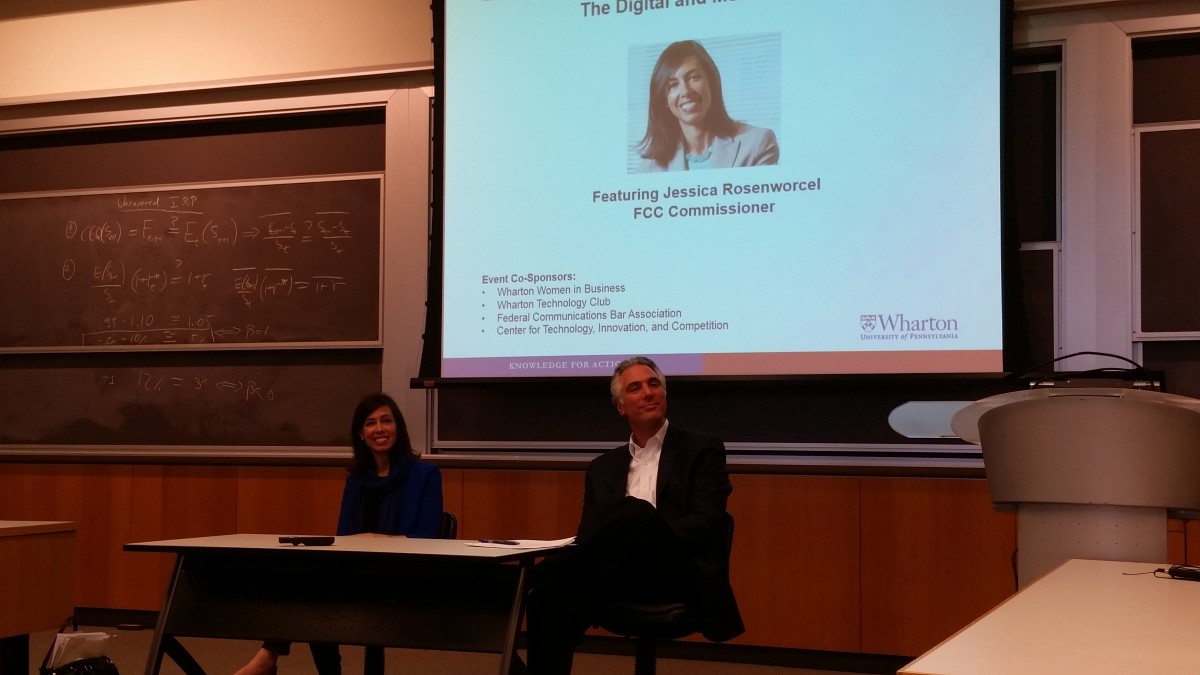“We live in the digital age. Everything about our lives is getting converted into zeros and ones, and all of that data is going to get connected.”
That’s how Jessica Rosenworcel, a commissioner at the Federal Communications Commission since 2012, opened up her casual question and answer session at the Wharton School on Wednesday.
“Those connections will take place in the airwaves all around us and the broadband beneath us,” she said. “Those networks are absolutely vital infrastructure for the future.”
According to the commissioner, WiFi in the U.S. is responsible for approximately $140 billion in economic activity every year. Get ready for the kicker:
There’s only so much spectrum — that invisible infrastructure in the sky that supports our entire wireless economy — designated for the use of WiFi. The rest is being hogged by radio waves, television signals and GPS tracking.
That’s why the FCC is now looking to leverage some of the more antiquated spectrum technologies in order to garner more space for wireless internet.
In effect, Rosenworcel said, the FCC is asking major broadcasters to entertain the idea of handing over their spectrum licenses to be auctioned off to wireless providers, to be used for satellite communications and mobile broadband.
In return, broadcasters get a cut of the proceeds.
“That’s a really creative and elegant way to repurpose some of our really valuable infrastructure for modern use,” said Rocenworcel, who was part of the team that advocated for the Congressional authorization of incentive auctions before her appointment in 2012 and is now tasked with implementing it with the FCC.
While a recent spectrum auction reeled in $41 billion, Rosenworcel said the FCC is hoping to get more of those auctions underway in the next year.
Obviously, creating more space in our spectrum for WiFi is prudent. But, Rosenworcel said, we need to make sure our wireless marketplace is more robust. That means more competition between ISPs.
More competition between providers would mean lower prices for consumers, better accessibility and higher rates of economic innovation. But where will broadband competition come from?
Maybe municipalities, where places like Chattanooga, Tenn., Wilson, N.C., and Cedar Falls, Iowa have seen great success?
Ehh, maybe not.
“I don’t think we should oversell the idea of municipal broadband,” Rosenworcel said, stressing the difficulty of purchasing, building and maintaining broadband infrastructure as a public utility. “I think what should be the guiding North Star here is how we get all of our cities gigabit service.”
Such as Lafayette, La., where every citizen has internet speeds up to one gigabit. Rosenworcel said we need that service in every metropolitan area, but solutions will vary from city to city.
“In some places it might be a municipal solution. In other places it might be a public-private partnership,” she said. In others still, she added, the solution could come from the private sector.
We might expect that from big telecom, but what about smaller, independent providers — such as mesh networks?
“I see more challenge than potential [with mesh networks] to be really honest with you,” Rosenworcel said. “I think they’re good solutions in some locations.” (Sidebar: maybe in NoLibs and Fishtown?)
While Rosenworcel did not discuss pending developments with the Comcast–Time Warner Cable merger, she continued to hint at the fact that competition is overall a good thing.
“We’ve got places in this country that are densely populated and we might have a business case for multiple providers,” she said.
Join the conversation!
Find news, events, jobs and people who share your interests on Technical.ly's open community Slack

Philly daily roundup: East Market coworking; Temple's $2.5M engineering donation; WITS spring summit

Philly daily roundup: Jason Bannon leaves Ben Franklin; $26M for narcolepsy treatment; Philly Tech Calendar turns one

Philly daily roundup: Closed hospital into tech hub; Pew State of the City; PHL Open for Business

